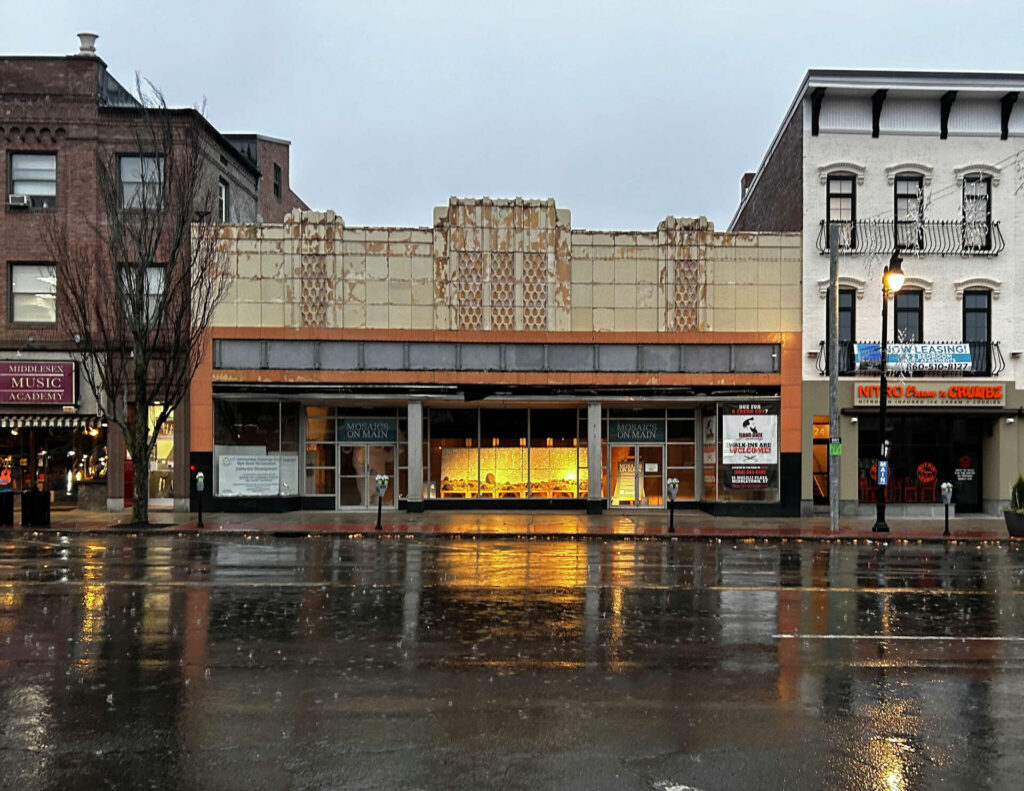MIDDLETOWN — A former state Department of Consumer Protection commissioner will be seeking approval to open an “extremely high-end” and “bougie” hybrid cannabis shop in the old Woolworth’s building.
Wallingford attorney Gerald Farrell Jr. spoke about the plan during Wednesday’s Downtown Business District meeting. He has partnered with Wallingford developer Dominick DeMartino, who is in the process of investing multimillions in the downtown, restoring historic Main Street structures and turning them into shops, apartments and restaurants.
An application has not yet been submitted to the Land Use Department.
The art deco structure at 428 Main St., built in 1939, was home to the F.W. Woolworth Co. until 1993. Later, Irreplaceable Artifacts opened there, but has since closed.
It is located between Nitro Cream’n Crumbz and Middlesex Music Academy.
The building is owned by DeMartino’s LLC, DFC of Main St. 428, according to the assessor’s database.
Farrell, who said he has already obtained a social equity license from the state at a cost of $3 million, runs the Quinnipiac Valley Growth Partners cannabis cultivation firm.
The tenant will be asking for a zoning change to move the entrance to the rear of the building on Melilli Drive, making sales discreet. It will also serve the future rooftop restaurant and patio, DeMartino explained.
The facility would sell recreational-use and medical cannabis products, but have no signage on Main Street.
The windows would be fitted with blackout film so people can’t see inside, DeMartino said, just like those at Venu Flower Collective on Washington Street.
“As with other jobs on Main Street, Sicily restaurant, the wine bar, cookies and ice cream, and including the barbershop, DiMartino Investments tries to build a superior product that’s ultra high-end,” he said.
Plans call for a “very bougie, over-the-top” type of dispensary that will be “extremely high-end,” said the developer, who added that he doesn’t expect individual customers to come in and simply buy pre-rolled cannabis cigarettes.
The building’s front facade will be restored to look like its “heyday,” DeMartino added.
Pricing will be relatively higher than other dispensaries, he explained, due to the facility’s “build-out and sheer size,” of 4,600 square feet.
Police officials told DiMartino that Venu has had no calls for service related to the retail shop since it opened, and there have been no incidents of people using cannabis in the surrounding Home Depot or Staples plazas or McDonald’s.
The DCP regulates pharmaceuticals and liquor, Farrell said. “I have a great familiarity and bit of a track record in Middletown,” he added, referring to his role in closing the former Public Bar and Grill at 377 Main St. in late 2009.
Venu only offers recreational marijuana, Farrell said, so this would be the first medical establishment in the city.
A pharmacist would be on-site at all times. Products would be kept in a large vault, said Farrell, who estimates the average purchase would be more than $100.
“This is not somebody who is idly walking in off the street; it is an intent purchaser,” he said.
Zak Kastenhuber, an independent consultant for the tenant, said he expects the city will receive between $200,000 to $300,000 a year from the 3% cannabis tax.
Meetings have been set up to talk to nonprofit organizations in the city, Farrell said, for the social equity portion of the project. DeMartino estimates donations will total between $10,000 and $20,000 a year.
The intention is to run a “low-key” facility that won’t be “in your face in any way,” Farrell said, as opposed to local smoke shops.
“I don’t want anyone to think that I would do this for the tenant or the profit,” DiMartino said. “If I thought this was detrimental to the investments I’ve made on Main Street or thought this would somehow make Main Street slide, I would never do this.”




